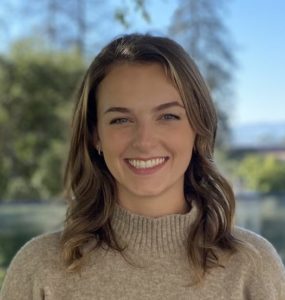
Startup Spotlight profiles startups founded by current Berkeley Haas students or recent alumni.
HOPO Therapeutics is a Berkeley-based biotech startup working to develop treatments for people exposed to toxic heavy metals in their homes, environments, and during medical procedures and treatments.
Hannah Weber, MBA/MPH 23, met HOPO co-founders Julian Rees and Rebecca Abergel—both scientists at the Lawrence Berkeley National Laboratory and leading experts in heavy metal poisoning–last year at a meet and greet hosted by the Berkeley Life Sciences Entrepreneurship Center.
The meeting was fortuitous. Weber came to Haas with a mission to work on developing a product or drug that could improve global health and to create a new model for access to medicine. Rees and Abergel told her that they’d been working on a drug to address lead poisoning and radiological hazards and were ready to find a partner to help raise funds and bring the drug to market. The meeting led Weber to join their team as vice president of strategy and business development.
A leap forward
More than 800 million children—about one third of the world’s young population—are currently living with lead poisoning, according to a UNICEF report. Other reports suggest half the current American population was exposed to harmful levels of lead in early childhood.
HOPO Therapeutics’ first product— HOPO-101—is a novel oral treatment that works by selectively binding to toxic metals so they can be removed from the body, a leap forward from older-generation treatments that also remove essential minerals in the process, Weber said.
The company expects the Phase 1 clinical trial to begin later this year, testing for the treatment’s safety in humans. “This innovative product has a broad application for hundreds of millions of people around the world suffering from heavy metal poisoning, and needs to be launched in a way that maximizes its application for public health,” said Weber.
“This innovative product has a broad application for hundreds of millions of people around the world suffering from heavy metal poisoning.”
HOPO-101 has received government funding to date, but one of Weber’s first goals for the company is to secure venture backing, starting with the company’s first seed round. Over the next five years, the company plans to develop relationships with physicians, governments, impact investors, and global health nonprofits to establish distribution channels.
“This is a lesson in sticking true to our values and finding partners that share our global health mission, and are eager to help us make it happen,” she said.
Weber pointed out that the pandemic has increased awareness of the importance of private and public partnerships in global health—her original mission for coming to Berkeley Haas.
“It’s made us all aware of the need for quick development and quick distribution of affordable life-saving drugs,” she said. “It’s also made the world appreciate the importance of public and private partnerships and the importance of collaboration across the table.”
Working on the company while at Haas also has its benefits, she said. “There are so many classes that allow you to explore your own venture within the classroom,” Weber said, noting that Health Management professional faculty members Kim MacPherson and Jeffrey Ford have been particularly helpful mentors. Weber has also found many opportunities to tap into the Bay Area startup ecosystem to advance the company, participating in the National Science Foundation’s I-Corps program for entrepreneurs, as well as the San Francisco B-School Disrupt showcase.
A passion for improving access
Weber, whose father was a physician, has been around healthcare her entire life and said she’s always had a passion for treating patients who had little access to care. Though she entered the undergraduate program at Georgetown University on a pre-med track, she quickly pivoted to global health and, more specifically, sought to focus her career on addressing how the pharmaceutical sector could be a partner in improved access.
An internship in Tanzania during college working on introducing digital innovations into government hospitals also led her to consider the impact a private company could have on global health. That led her to L.E.K. Consulting after graduating, where she worked in the Life Sciences Practice for nearly four years. Learning about strategy and market access from the point of view of pharmaceutical companies, made her look forward to being involved in making some of those company-forming decisions.
“I was excited at the prospect of working with a team developing novel medicines and asking big questions about how we could get them to people that needed them most,” Weber said. “I was looking to get involved with a small company launching a new technology, one that had that mission in mind.”
That mission led her to pursue an MBA/MPH at Haas, and has been the foundation for growing HOPO Therapeutics.
“I had a strong conviction that it was possible to do well and to do good. Business school has been an eye-opening chance to see how it’s possible,” she said. “Luckily, I’ve found a community at Haas and at HOPO that really resonates with that idea.”